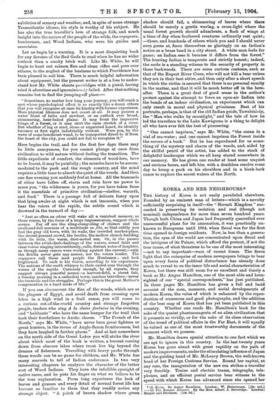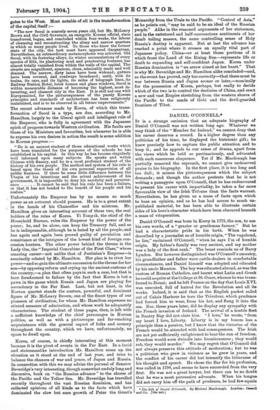THE history of Korea is not easily paralleled elsewhere. Founded
by an eminent man of letters—which is a novelty sufficiently surprising in itself—the "Hermit Kingdom" suc- ceeded in preserving its isolation and real (though not nominal) independence for more than seven hundred years. Though both China and Japan had frequently quarrelled over unsuccessful plans for its annexation, it was practically un- known to Europeans until 1884, when Seoul was for the first time opened to foreign residents. Now, in less than a genera- tion, the eyes of the world are concentrated upon Seoul and the intrigues of its Palace, which afford the pretext, if not the true cause, of what threatens to be one of the most interesting —not to say important—wars of recent times. The fierce light that the enterprise of modern newspapers brings to bear upon every focus of political disturbance has already done much to reveal to us the inner life and social characteristics of Korea, but there was still room for so excellent and timely a book as Mr. Angus Hamilton, one of the most able and keen- sighted of our "special correspondents," has just published. In these pages Mr. Hamilton has given a full and lucid account of the men, manners, and social developments of modern Korea, the value of which is enhanced by the repro- duction of numerous and good photographs, and the addition of the best map of Korea that has yet been published in this country. Whether one reads Mr. Hamilton's book for the sake of the quaint phantasmagoria of an alien civilisation that it presents so vividly, or for the sake of its close observation of the trend of political affairs in the Far East, it will equally be valued as one of the most trustworthy documents of the moment which we possess.
Mr. Hamilton draws special attention to one fact which we are apt to ignore in this country. In the last twenty years Korea has gone ahead with great rapidity on the path of modern improvements, under the stimulating influence of Japan and the guiding hand of Mr. McLeavy Brown, the well-known head of her Foreign Customs Service. Round her capital, at any rate, the inauguration of the new era strikes a traveller very forcibly. Trains and electric trams, telegraphs, tele- phones, and an efficient postal service bear witness to the speed with which Korea has advanced since she opened her
• (1) Korea. By Angus Hamilton. London : W. Heinemann. [Bs. net.] —(2) The Russian Advance. By the Hon. Albert J. Beveridge. London Harper and Brothers. [10.. 6d.]
gates to the West. Most notable of all is the transformation of the capital itself :—
" The new Seoul is scarcely seven years old, but Mr. McLeavy Brown and the Civil Governor, an energetic Korean official, since transferred, began, and concluded within four weeks, the labour of cleansing and reconstructing the slimy and narrow quarters in which so many people lived. To those who knew the former state of the city, the task must have appeared Gargantuan. Nevertheless, an extraordinary metamorphosis was achieved. Old Seoul, with its festering alleys, its winter accumulations of every species of filth, its plastering mud and penetrating foulness, has almost totally vanished from within the walls of the capital. The streets are magnificent, spacious, clean, admirably made and well drained. The narrow, dirty lanes have been widened; gutters have been covered, and roadways broadened ; until, with its trains, its ears, and its lights, its miles of telegraph lines, its Railway Station Hotel, brick houses and glass windows, Seoul is within measurable distance of becoming the highest, most in- teresting, and cleanest city in the East. It is still not one whit Europeanised, for the picturesqueness of the purely Korean principles and standards of architecture has been religiously maintained, and is to be observed in all future improvements."
The recent advances made by Korea, of which this trans- formation of Seoul is a type, are due, according to Mr. Hamilton, largely to the liberal spirit and intelligent rule of the Emperor, who is fully in agreement with the Japanese spirit of progress towards Western civilisation. His faults are those of his Ministers and favourites, but whenever he is able to express his own desires in action the result is some addition to Korean progress :—
"He is an earnest student of those educational works which have been translated for the purposes of the schools he has established in his capital. In this way he has become singularly well informed upon many subjects. He speaks and writes Chinese with fluency, and he is a most profound student of the history of his own people. The method and system of his rule is based upon the thesis of his own personal supervision of all public business. If there be some little difference between the Utopia of his intentions and the actual achievement of his government, it is impossible to deny his assiduity and persever-
ance It cannot be said that his rule has been a failure, or that it has not tended to the benefit of his people and his realms."
Unfortunately the Emperor has by no means so much power as an autocrat should possess. He is to a great extent
in the hands of his Chancellor and his mistress. Mr. Hamilton gives an interesting account of these two, the real holders of the reins of Korea. Yi Yong-ik, the chief of the Household Bureau, rules the Emperor by the power of the purse ; he, and he alone, can keep the Treasury full, and so he is indispensable, although he is hated by all the people, and has again and again been proved guilty of peculation and connivance at the intrigues of the lowest kind of foreign con- cession hunters. The other power behind the throne is the Lady Om, the "Imperial Concubine of the First Class," whose amazing career—not unlike that of Justinian's Empress—is succinctly related by Mr. Hamilton. Her plan is to rivet her power—and so gain the ultimate succession to the throne for her son—by opposing reform and crying up the ancient customs of
the country,—a plan that often pays in such a case, but that is here foredoomed to failure by the fact that Korea is but a pawn in the game which Russia and Japan are playing for ascendency in the Far East. Last, but not least, in the Korean quartet stands the austere, powerful, and dominant
figure of Mr. McLeavy Brown, one of the finest types of our pioneers of civilisation, for whom Mr. Hamilton expresses no stinted measure of admiration, and whose work he adequately characterises. The student of these pages, then, is left with a sufficient knowledge of the chief personages in Korean politics, as well as with a picturesque and far-reaching acquaintance with the general aspect of folks and scenery throughout the country, which we have, unfortunately, no space to dwell upon.
Korea, of course, is chiefly interesting at this moment because it is the pivot of events in the Far East. In a lucid and statesmanlike introduction Mr. Hamilton sums up the situation as it stood at the end of last year, and tries to balance the chances of war and peace, of Japan and Russia.
In connection with this we may advise the perusal of Senator Beveridge's very interesting, though somewhat unduly long and discursive, book on "the Russian advance" to the shores of the Pacific and the Yellow Sea. Mr. Beveridge has travelled recently throughout the vast Russian dominion, and has collected opinions of all kinds as to the facts which have dominated the slow but sure growth of Peter the Great's
Monarchy from the Urals to the Pacific. "Control of Asia," as he points out, "may be said to be an ideal of the Russian people." Alike in the reasoned arguments of her statesmen, and in the untutored and half-unconscious sentiments of her dumb toiling masses, the same controlling sense of Holy Russia's destiny is apparent. But at last the advance has reached a point where it crosses an equally vital part of Japanese policy. China—or at least those portions of it which front the Land of the Rising Sun—represents life or death to expanding and self-confident Japan. Korea under Russian domination is "an arrow aimed at her heart." That is why Mr. Beveridge and Mr. Hamilton alike concluded—and, as the event has proved, only too correctly—that there must be war between Russia and Japan sooner or later,—nominally for the possession of Korea, perhaps, but really to decide which of the two is to control the destinies of China, and erect a new and vast Empire stretching from the western shores of the Pacific to the sands of Gobi and the devil-guarded frontiers of Tibet.







































 Previous page
Previous page